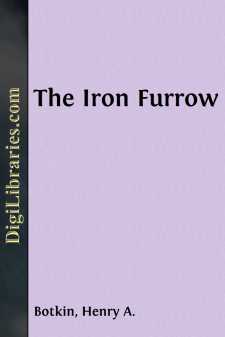Categories
- Antiques & Collectibles 13
- Architecture 36
- Art 48
- Bibles 22
- Biography & Autobiography 813
- Body, Mind & Spirit 142
- Business & Economics 28
- Children's Books 17
- Children's Fiction 14
- Computers 4
- Cooking 94
- Crafts & Hobbies 4
- Drama 346
- Education 46
- Family & Relationships 57
- Fiction 11829
- Games 19
- Gardening 17
- Health & Fitness 34
- History 1377
- House & Home 1
- Humor 147
- Juvenile Fiction 1873
- Juvenile Nonfiction 202
- Language Arts & Disciplines 88
- Law 16
- Literary Collections 686
- Literary Criticism 179
- Mathematics 13
- Medical 41
- Music 40
- Nature 179
- Non-Classifiable 1768
- Performing Arts 7
- Periodicals 1453
- Philosophy 64
- Photography 2
- Poetry 896
- Political Science 203
- Psychology 42
- Reference 154
- Religion 513
- Science 126
- Self-Help 84
- Social Science 81
- Sports & Recreation 34
- Study Aids 3
- Technology & Engineering 59
- Transportation 23
- Travel 463
- True Crime 29
The Iron Furrow
by: Henry A. Botkin
Categories:
Description:
Excerpt
THE IRON FURROW
The Ventisquero Range stretches across the circumference of one's vision in a procession of mountains that come tall and blue out of the distant north and seemingly march past to vanish in the remote south like azure phantoms. The mountains wall the horizon and dominate the mesa, their black forest-clad flanks crumpled and broken and gashed by cañons, lifting above timber-line peaks of bare brown rock that pierce the clouds floating along the range. At sunrise they cast immense shadows upon the mesa spreading westward from their base; and at sunset they reflect golden and purple glows upon the plain until the earth appears swimming in some iridescent sea of ether; while over them from dawn till dusk, traversed by a few fleecy clouds, lies the turquoise sky of New Mexico.
At a certain point in the range a small cañon opens upon the mesa with a gush of gravel and sand that flows a short way into the sagebrush and forms a creek bed. Tucked back in the little cañon there is a considerable growth of bushes and trees, cool and fresh-looking in the shadow of the gorge during the summer season, a splash of vivid green there at the bottom of the dusty gray mountain, but at the cañon's mouth this verdure ceases.
Only an insignificant stream of water ran, one day, in the stony creek bed that meandered out upon the mesa, and it appeared under the hot July sun and among the hot stones for all the world like a rivulet of liquid glass. That was all the mesa had to show, only its endless gray sagebrush and the creek bed almost dry—unless one should reckon the three parched cottonwood trees beside the stream, a little way down from the cañon, and the flat-roofed adobe house near by, and the empty corral behind built of aspen poles. In that immensity of mountain and mesa the house looked like a brick of sun-baked mud, the corral like a child's device of straws, the three cottonwoods like three twigs stuck in the earth. Or, at any rate, that is how they appeared to a horseman regarding them from the main mesa trail a mile away.
The rider, a slender tanned young fellow of about twenty-eight, sat in the saddle with the relaxed ease of habit which allowed his body to accommodate itself to the steady jogging trot of his horse. A roll comprising clothes wrapped in a black rubber coat was tied behind the cantle. His Stetson hat was tilted up at the rear and down in front almost on his nose—a thin, bony nose, slightly curved and with the suggestion of a hook in the tip, just the sort of nose to accord with his lean, sunburnt cheeks and clean-cut chin and straight-lipped mouth. Under the hat brim drawn forward to his line of vision his eyes, notwithstanding his air of lounging indolence, gazed forth keen and observant. He had the appearance of a man who might be seeking a few stray cattle, or riding to town for mail, and in no particular hurry about it, either, this hot afternoon; but, for all that, Lee Bryant was proceeding on important business—important for him, anyhow....


